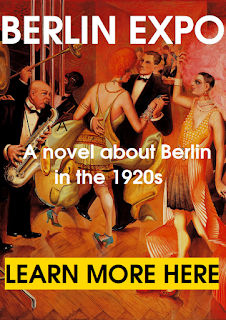 |
| The TV-series Moka Efti |
In the successful
german TV-series Babylon Berlin, much of the action takes place in a
nightclub called Moka Efti. There is no such place in today’s
Berlin. But there has been one.
The original Moka
Efti was a cafe in the corner Leipziger Strasse Friedrichstrasse. It
was named after its Greek-Italian owner, whose family name was Eftimiades. Later,
he purchased a larger two-floor palais, on the
Friedrichstrasse.
The decor inside the
original place was even wilder than the TV producers could imagine. An elevator took visitors from street level to the first
floor – a technical invention so new that many Berliners visited
Moka Efti merely to enjoy the ride.
In the TV series,
Berlin’s superclub has a futuristic design with stripped-back walls and geometric towers of
light. Modern architecture being fashionable in Weimar Germany, that
doesn’t strike one as especially out of place (or time). Still,
the original joint was more backward-looking. Customers could marvel
at Moorish arches, panoramic paintings and Turkish and Egyptians
salons.
 |
| Moka Efti: the Turkish Salon |
A WHOLE SITE ABOUT THE TV-SERIES "BABYLON BERLIN".
Click here!
There was a billiard
hall, a barber shop and correspondence room filled with typists ready
to take dictation. A white marble pastry shop connected to a bar via
a corridor that was designed to look like a sleeper train on the
Orient Express.
Along with the HausVaterland on Potsdamer Platz, where model trains and miniature planes
on strings zipped among the coffee drinkers, Moka Efti was one of the
most prominent themed establishments offering exotic entertainment. Unlike in the series, there was no brothel in the basement atMoka Efti, but the link is not far-fetched: a number of dance
halls were markets for prostitution as well. And there were not just
women offering escort services : the director Billy Wilder is said to have worked as a “taxi dancer” at a Berlin hotel in
1926. Which is not to say that his job included sexual services, though.
More about Moka
Efti’s history, in The Guardian, 24 november 2017, a piece byPhilip Oltermann.
The picture above shows Charlotte Ritter entering the basement of café Moka Efti, which, unlike
the ground floor, was (in the TV-series, not in the real Moka Efti) a
brothel. Charlotte can of course not be described as a "whore". Though young, she is the provider of a family of 5-6 persons and she tries to make a living out of taking occasional clerical jobs at the High Commission of Berlin police. But, those small jobs not being enough to make both ends meet, she does sell sex on occasions, at Moka Efti's basement. When no customer requires her services, she amuses herself at the nightclub like any other guest.
It is surprising how thin the line could be between prostitution and "decent life" in 1920s Berlin. And in the TV-series we can see how easily customers glide between the restaurant part and the brothel, which has nothing specially clandestine about it. They had, though, to be waved through by the receptionist, the scantily clad lady to the left of the picture above.
More about similar places in 1920s Berlin, in this link.
It is surprising how thin the line could be between prostitution and "decent life" in 1920s Berlin. And in the TV-series we can see how easily customers glide between the restaurant part and the brothel, which has nothing specially clandestine about it. They had, though, to be waved through by the receptionist, the scantily clad lady to the left of the picture above.
More about similar places in 1920s Berlin, in this link.
 |


No comments:
Post a Comment